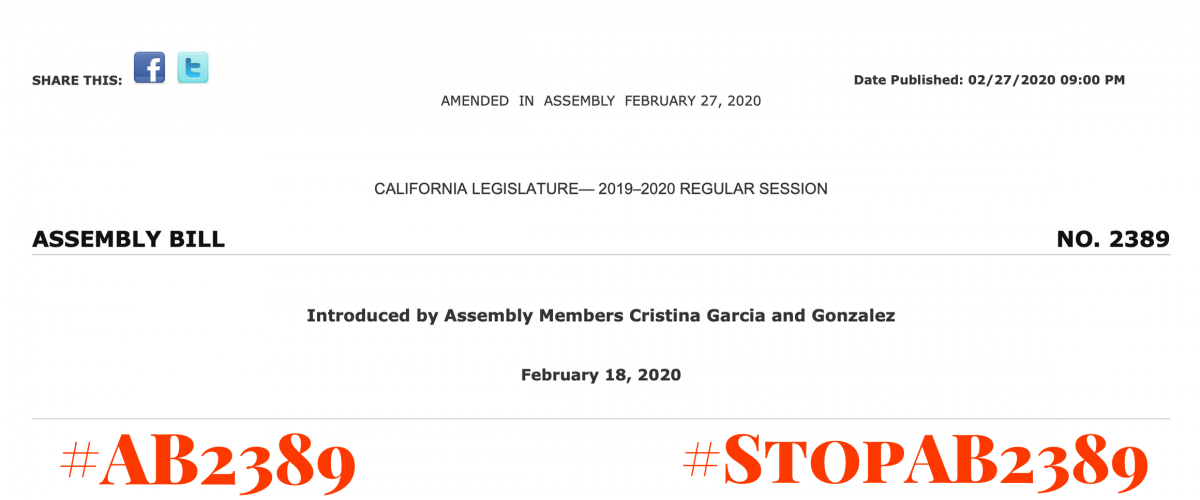Last month, Assembly Bill No. 2389 (AB2389) was introduced in the California State Legislature. If you are not already familiar with this bill, you need to be. Read YNOT’s summary of AB2389 here.
As introduced on February 18, 2020, the bill required all adult entertainers in the state of California to obtain a business license and a training certificate (to be renewed every three years). Part of the training certificate required Live Scan fingerprinting.
Yes, Assemblymember Cristina Garcia wants all adult entertainers in the state of California to be fingerprinted and registered in some government-monitored database. (No, thanks!) Learn more about this technology from Accurate Biometrics and the National Center for Safety Initiatives.
The original text of AB2389 as introduced by Asm. Garcia can be found here. The bill was originally co-sponsored by Asm. Lorena Gonzalez, champion of the controversial Assembly Bill No. 5, another California-based initiative that reclassified certain independent contractors as employees. Asm. Gonzalez has since withdrawn her support of AB238, and the bill has been amended to exclude the business license and fingerprinting requirements. The most recent version, amended February 27, can be viewed here.
The bill has been amended — but it is not gone, nor is its current iteration without problematic, controversial elements.
The Free Speech Coalition (FSC), the Adult Performers Actors Guild (APAG), the Adult Industry Laborers and Artists Association (AILAA) and many industry members have made statements criticizing the proposed legislation.
Corey D. Silverstein, Esq. (@myadultattorney) compared AB2389 to The Scarlet Letter. Asm. Gonzalez said that the concept of the bill was introduced to legislators by the International Entertainment Adult Union (IEAU), APAG’s parent group. According to APAG president Alana Evans, the IEAU did not consult with APAG before going forward. Mike Stabile, Director of Communications at the FSC, also said legislators failed to consult with others in the industry.
While California Assembly Member Lorena Gonzalez has removed her name and support from #AB2389 we need to continue to push Assembly Member Cristina Garcia to withdraw her ill-begotten bill. As I and our entire community implore her to withdraw, she has the opportunity to end it.
— Alana Evans (@alanaevansxxx) February 21, 2020
Asm. Garcia has spoken with members of the FSC, APAG and AILAA to discuss these controversial proposals. Though the bill has been revised, industry activists maintain that AB2389 is, put simply, a total mess.
The Department of Industrial Relations would be in charge of training adult entertainers on: rights and responsibilities, reporting workplace injuries, abuse and harassment, finding and reporting human trafficking, resources for assistance and STIs. If/when the law is passed, all California-based entertainers would be required to complete this training to obtain a certificate. They would then need to renew this certificate every three years. (The first draft of the bill required Live Scan fingerprinting as part of the training, but that part was proposed to be removed.) Entertainers who must complete the training are also stuck with paying for it, which “shall not exceed the reasonable cost of providing the training.” Conveniently, the bill does not specify what is or isn’t a “reasonable cost.”
The bill would require the establishment of a governor-appointed “advisory group” to assist with the training curriculum. The group would consist of one licensed therapist, one licensed money manager, two medical doctors, two (current or former) porn performers and three (current or former) dancers. This excludes significant portions of the adult industry the bill proclaims to care about — full service sex workers, cam models and more. Even so, the text does acknowledge “internet web-camming sites” as part of the adult industry that falls under this legislation, but doesn’t leave room for cam models to be represented on the board.
Asm. Garcia feels that AB2389 is necessary to ensure sexual health and reduce human trafficking, while upholding what seems like a genuine lack of understanding of the adult industry. Garcia brings to mind the misleading anti-sex work position of Republican Ann Wagner (R-MO), key sponsor of FOSTA/SESTA. California’s adult industry is far from perfect, like any other job field, but this bill is not the answer to any of our problems.
#AB2389 enacts differential treatment of adult industry workers versus the treatment of other workers in California. The discriminatory treatment is based solely on the false and stigmatizing language present and furthered by this bill. @asmgarcia MUST #KILLAB2389
— ? Mary Moody ? CB Broadcaster of the Year ? (@missmarymoody) February 25, 2020
AB2389 is reminiscent of an earlier California bill, Proposition 60, which was on the ballot in 2016. (It didn’t pass.)
Like AB2389, Prop. 60 also involved intrusive regulation of consensual acts among adult performers and threatened personal security. Prop. 60 would have required porn performers to wear condoms when filming “vaginal or anal penetration by a penis.” If they didn’t, anyone involved in the production could be sued.
The potential for lawsuits would have endangered the personal information of industry members. Producers would have had to contact the California Division of Occupational Safety and Health (Cal/OSHA) every time they made a film. They would have had to prove to Cal/OSHA that condoms were worn, even if the actual penetration was not shown in the content distributed to consumers.
Like AB2389 proposed requiring business licenses and training certificates, Prop 60 would have mandated adult performers to report to Cal/OSHA to renew licenses every two years. Similar to Prop 60’s violations of privacy and free expression, AB2389 initially proposed requiring adult entertainers to be fingerprinted. Of note, the most recent amended version has removed the requirement to obtain a business license and the requirement to be fingerprinted. Throughout the industry, the general consensus (outside of IEAU) seems to be that AB2389 needs to be killed, not revised.
To keep up with Assembly Bill No. 2389, follow @stopab2389, @APAGUnion, @AILAAssoc and the hashtags #AB2389 and #StopAB2389.
There are many more reasons to oppose this bill, even with amendments the bill creator has addressed.
You can read the entire bill here to form your own opinion, but we stand against #AB2389 and ask the L&E Board to please, #KILLAB2389 https://t.co/DNOcV37jX9
— AILAA (@AILAAssoc) March 9, 2020
—
Alsanna James is a student, advocate, spoonie, writer, gamer and adult content creator. Half silent oracle, half professional sexpot, you can email her at alsanna@ynotcam.com and find her on Twitter at @AlsannaJames.
Background banner image screengrab and modifications via YNOT Cam.










